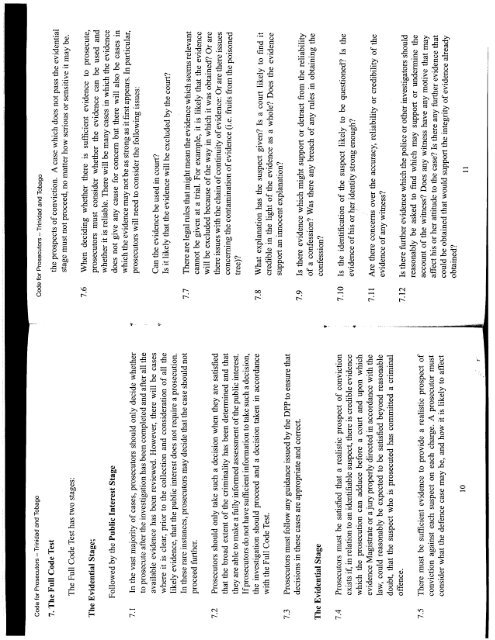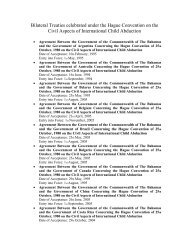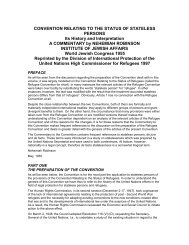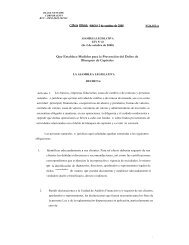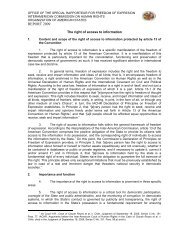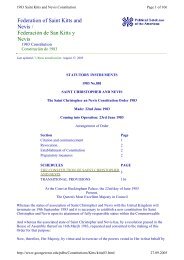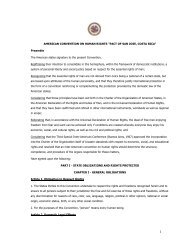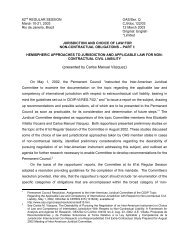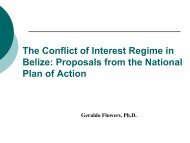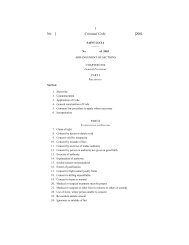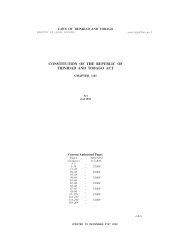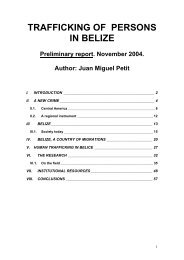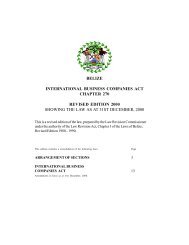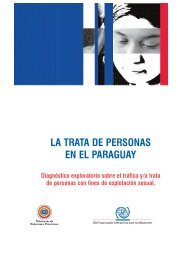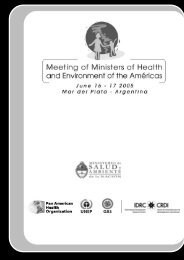Code for Prosecutors - OAS
Code for Prosecutors - OAS
Code for Prosecutors - OAS
Create successful ePaper yourself
Turn your PDF publications into a flip-book with our unique Google optimized e-Paper software.
<strong>Code</strong> <strong>for</strong> <strong>Prosecutors</strong> - Trinidad and Tobago<br />
7. The Full <strong>Code</strong> Test<br />
The Full <strong>Code</strong> Test has two stages:<br />
The Evidential Stage;<br />
Followed by the Public Interest Stage<br />
7.1 In the vast majority of cases, prosecutors should only decide whether<br />
to prosecute after the investigation has been completed and after all the<br />
available evidence has been reviewed. However, there will be cases<br />
where it is clear, prior to the collection and consideration of all the<br />
likely evidence, that the public interest does not require a prosecution.<br />
In these rare instances, prosecutors may decide that the case should not<br />
proceed further.<br />
7.2 <strong>Prosecutors</strong> should only take such a decision when they are satisfied<br />
that the broad extent of the criminality has been determined and that<br />
they are able to make a fully in<strong>for</strong>med assessment of the public interest.<br />
If prosecutors do.not have sufficient in<strong>for</strong>mation to take such a decision,<br />
the investigation should proceed and a decision taken in accordance<br />
with the Full <strong>Code</strong> Test.<br />
7.3 <strong>Prosecutors</strong> must follow any guidance issued by the DPP to ensure that<br />
decisions in these cases are appropriate and correct.<br />
The Evidential Stage<br />
7.4 <strong>Prosecutors</strong> must be satisfied that a realistic prospect of conviction<br />
exists if, in relation to an identifiable suspect, there is credible evidence<br />
which the prosecution can adduce be<strong>for</strong>e a court and upon which<br />
evidence Magistrate or a jury properly directed in accordance with the<br />
law, could reasonably be expected to be satisfied beyond reasonable<br />
doubt, that the suspect who is prosecuted has committed a criminal<br />
offence.<br />
7.5 There must be sufficient evidence to provide a realistic prospect of<br />
conviction against each suspect on each charge. A prosecutor must<br />
consider what the defence case may be, and how it is likely to affect<br />
10<br />
<strong>Code</strong> <strong>for</strong> <strong>Prosecutors</strong> - Trinidad and Tobago<br />
the prospects of conviction. A case which does not pass the evidential<br />
stage must not proceed, no matter how serious or sensitive it may be.<br />
7.6 When deciding whether there is sufficient evidence to prosecute,<br />
prosecutors must consider whether the evidence can be used and<br />
whether it is reliable. There will be many cases in which the evidence<br />
does not give any cause <strong>for</strong> concern but there will also be cases in<br />
which the evidence may not be as strong as it first appears. In particular,<br />
prosecutors will need to consider the following issues:<br />
Can the evidence be used in court?<br />
Is it likely that the evidence will be excluded by the court?<br />
7.7 There are legal rules that might mean the evidence which seems relevant<br />
cannot be given at a trial. For example, it is likely that the evidence<br />
will be excluded because of the way in which it was obtained? Or are<br />
there issues with the chain of continuity of evidence: Or are there issues<br />
concerning the contamination of evidence (i.e. fruits from the poisoned<br />
tree)?<br />
7.8<br />
What explanation has the suspect given? Is a court likely to find it<br />
credible in the light of the evidence as a whole? Does the evidence<br />
support an innocent explanation?<br />
7.9<br />
Is there evidence which might support or detract from the reliability<br />
of a confession? Was there any breach of any rules in obtaining the<br />
confession?<br />
7.10<br />
Is the identification of the suspect likely to be questioned? Is the<br />
evidence of his or her identity strong enough?<br />
7.11<br />
Are there concerns over the accuracy, reliability or credibility of the<br />
evidence of any witness?<br />
7.12<br />
Is there further evidence which the police or other investigators should<br />
reasonably be asked to find which may support or undermine the<br />
account of the witness? Does any witness have any motive that may<br />
affect his or her attitude to the case? Is there any further evidence that<br />
could be obtained that would support the integrity of evidence already<br />
obtained?<br />
11


